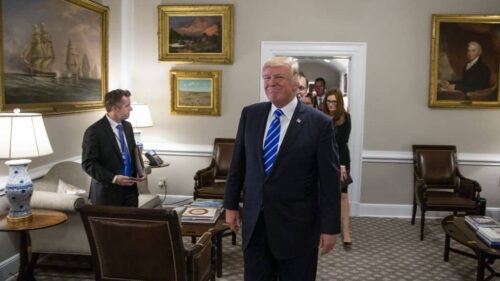In 1979, in an otherwise unremarkable case called Reiter v. Sonotone Corp., the United States Supreme Court, citing former attorney general, corporate lawyer and failed nominee to the Court Robert Bork, claimed Congress’ intent in enacting the Sherman Antitrust Act was not to protect the public from concentrated corporate power or unfair competition, but merely to create a “consumer welfare prescription.” Bork published a book the year prior titled “The Antitrust Paradox” which was deeply influential throughout the 1980s and beyond in commencing an era of lax antitrust enforcement.
The consumer welfare standard, as it would henceforth be known, is understood to suggest an act is anticompetitive only when it leads to higher prices. So long as a merger did not interfere too heavily with the availability of cheap consumer goods for Americans, it would be rubberstamped by the government.
This came amid a broader sea change in US economic policy. Following the stagflation of the late 1970s, the Reagan Administration undertook broad deregulatory efforts to juice the markets. The 1980s became the decade of Wall Street.
After the Cold War ended in 1991, America was a unipolar power. President Clinton, a “New Democrat,” fostered a bipartisan tradition of neoliberalism. Clinton spoke of a peace dividend, signed NAFTA into law and embraced the creation of the World Trade Organization.
Manufacturing and supply chains were globalized, flooding the US with cheap foreign goods. As China emerged as a world power, it was believed––incorrectly––that access to free trade would restrain its worst communist tendencies and hegemonic ambitions. Corporate revenues climbed and merger activity boomed. Neoliberalism, to many, seemed like a winner.
But by the 2010s, America had new problems to deal with. Decades of consolidation, free trade and deindustrialization had created an economy with collapsing social mobility and a depleted industrial base that can’t make enough of what we need, things like:
- Masks and ventilators during the pandemic
- Artillery shells and munitions to aid allies like Ukraine in wartime
- Aircraft that don’t fall out of the sky or leave astronauts stranded in space
- High tech computer chips
- Baby formula, eggs, cars and many other goods suddenly revealed to Americans as available only at the whim of far flung supply chains, labor arbitrage and anemic levels of market competition.
In a 2023 Gallup poll, just 18% of Republican voters, historically a solidly “pro-business” bunch, said they had a “great deal” or “quite a lot” of confidence in big business—a record low. By 2024, a growing and eventually dominant base of populist voters in the US had found a home in the MAGA movement.
As the Democratic Party steadfastly committed to the status quo, US President Donald Trump harnessed the power of his base—rejecting free trade and enacting expansive tariffs aimed at reshoring manufacturing, brought antitrust cases against Big Tech and surrounded himself with economic populists like vice president JD Vance, a vocal fan of Biden FTC Chair and antimonopolist Lina Khan. Ms. Khan was a trailblazer at the FTC, attacking inefficient and monopolized markets with a fervor not seen in decades.
Trump appointed as his FTC Chair Andrew Ferguson, who in his first months on the job moved to block multiple mergers, announced that the 2023 Merger Guidelines created under US President Joe Biden that significantly strengthened antitrust enforcement would continue and, according to CNBC, signaled a continued break with neoliberal antitrust policy when telling a room of CEOs at the Business Roundtable that “this isn’t the FTC of the 90s” and, for good measure, “this isn’t the [US President George W.] Bush Administration.”
Wall Street hoped a second Trump term would represent a return to the old status quo on antitrust and trade. But by 2025, the “status quo” was long over.
Merger and acquisition (M&A) activity––the deals firms engage in to eliminate competitors and strengthen pricing power, ground to a halt as the financial class, which had been expecting Trump not to actually follow through on his campaign pledges, sat stunned as he did just that––unfurling unprecedented protectionist tariffs on global trade.
The conservative legal movement, now at the height of its power, is left in an interesting position. Historically, it has espoused a strong libertarian bent when it comes to trade and antitrust. However, the continued success of the conservative legal movement depends upon the continued viability and success of the conservative political movement on which it relies.
As Republican voters identify with Trump’s populist orientation, up and coming young conservative talent features ardent populists like Vice President JD Vance and Senator Josh Hawley. Hardcore free traders like retiring former Senate Majority Leader Mitch McConnell are getting pushed aside by the Republican base––dismissed as “globalists,” or perhaps worst of all, having their candidacies compared to a former presidential candidate, US Senator Mitt Romney.
As for Democrats, most onlookers believe the party’s only path out of the political wilderness is to return to its roots as a working-class populist party and, to some extent, out-Trump Trump.
Taking these developments together, it would seem that no matter who wins in 2028 and beyond, the era of neoliberal economics has ended.
In the 1980s, no one would have believed it would be a Republican, least of all then business tycoon Donald Trump, who would turn out the lights.
The views expressed in this article are the author’s own and do not necessarily reflect Fair Observer’s editorial policy.
Support Fair Observer
We rely on your support for our independence, diversity and quality.
For more than 10 years, Fair Observer has been free, fair and independent. No billionaire owns us, no advertisers control us. We are a reader-supported nonprofit. Unlike many other publications, we keep our content free for readers regardless of where they live or whether they can afford to pay. We have no paywalls and no ads.
In the post-truth era of fake news, echo chambers and filter bubbles, we publish a plurality of perspectives from around the world. Anyone can publish with us, but everyone goes through a rigorous editorial process. So, you get fact-checked, well-reasoned content instead of noise.
We publish 3,000+ voices from 90+ countries. We also conduct education and training programs
on subjects ranging from digital media and journalism to writing and critical thinking. This
doesn’t come cheap. Servers, editors, trainers and web developers cost
money.
Please consider supporting us on a regular basis as a recurring donor or a
sustaining member.
Will you support FO’s journalism?
We rely on your support for our independence, diversity and quality.











Comment